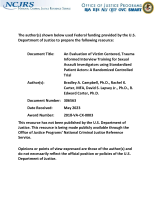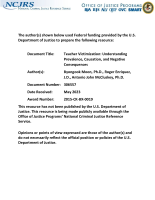Sexual assault
Detectives’ Descriptions of Their Responses to Sexual Assault Cases and Victims: Assessing the Overlap Between Rape Myths and Focal Concerns
Detecting Drug Exposure Long After the Fact: New Method Proves Effective
The sexual assault microbiome: Detecting contact when minimal male DNA is present.
Alternative direct-to-amplification sperm cell lysis techniques for sexual assault sample processing
Victimization of Sexual Minority Latinx Youth: Results From a National Survey
Cold Cases and Serial Killers, Part 1
In April 2018, the Golden State Killer, Joseph DeAngelo was arrested. NIJ support helped lead to his arrest, and in the aftermath of the arrest, NIJ Social Science Analyst Eric Martin was among those tasked with finding other cases NIJ helped law enforcement solve. Eric joins the show to talk about some of those cases, and answer some broader questions about serial killers: What is a serial killer? Are they on the rise? How do we know how many serial killers are currently active?
Developmental Validation of a Novel Multi-analyte Recovery Method for Trace Biological Samples
Time Since Deposition for Touch DNA Evidence
Reproductive Coercion and Intimate Partner Violence Victimization Among a Racially and Ethnically Diverse Young Adult Sample
Military Sexual Trauma Experiences of Female Veterans in Michigan
Automation of Sexual Assault DNA Processing Increases Efficiency
Inclusive Research: Engaging People Closest to the Issue Makes for Better Science & Greater Impact; 2023 NIJ Research Conference Plenary
This panel will discuss what inclusive research is, how to conduct it, and what issues and challenges exist about engaging in it. “Inclusive research” has its history as a participatory research method designed to ensure people closest to the issue or problem under study are authentically engaged in the research process rather than simply being “research subjects.” While community-based participatory research has begun to take on greater prominence in the criminal justice realm, such efforts are largely confined to qualitative research inquiries.
See the YouTube Terms of Service and Google Privacy Policy
Can Science Enhance Equity? Findings and Implications From a Study To Detect Bruising on Victims with Dark Skin Pigmentation
This plenary panel from the 2023 NIJ Research Conference features fascinating research on a methodology to improve the detection and documentation of bruises on victims of violence who have dark skin pigmentation. This study highlights the intersection between science, justice, and racial equity, featuring practitioner and victims’ advocacy perspectives. The discussion describes the research and its findings and explore strategies to ensure that this particular evidence-based methodology can be widely implemented by nurse practitioners in the field.
Participants:
See the YouTube Terms of Service and Google Privacy Policy






